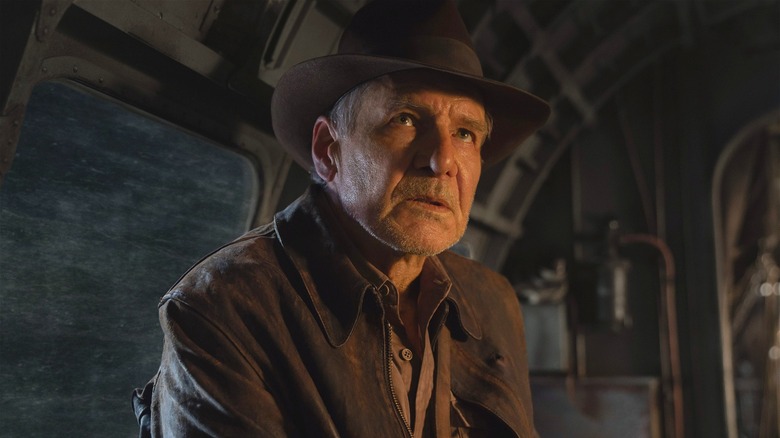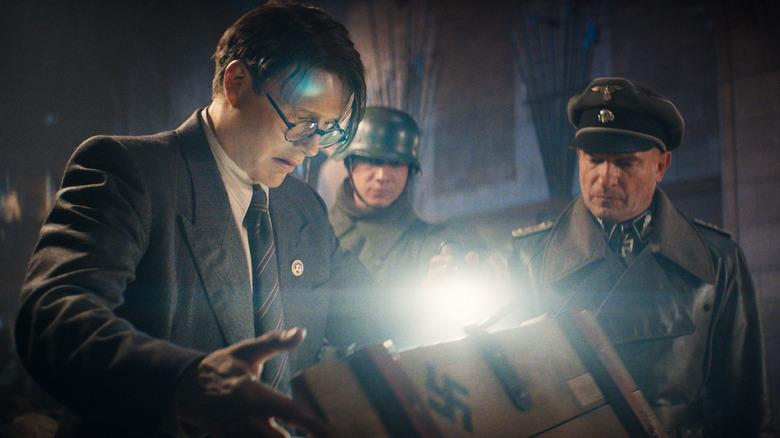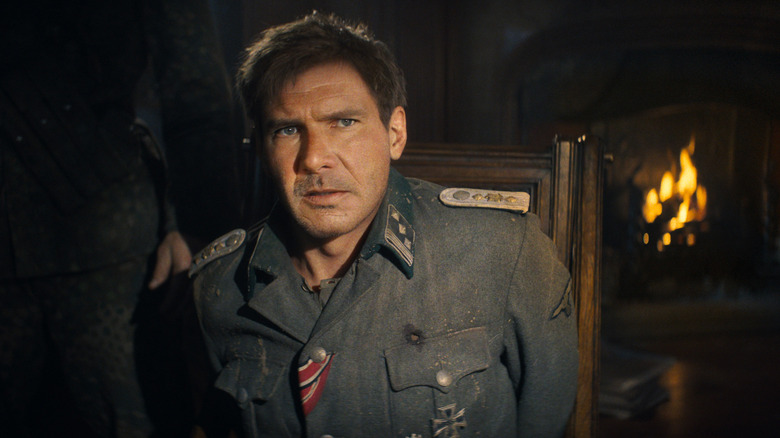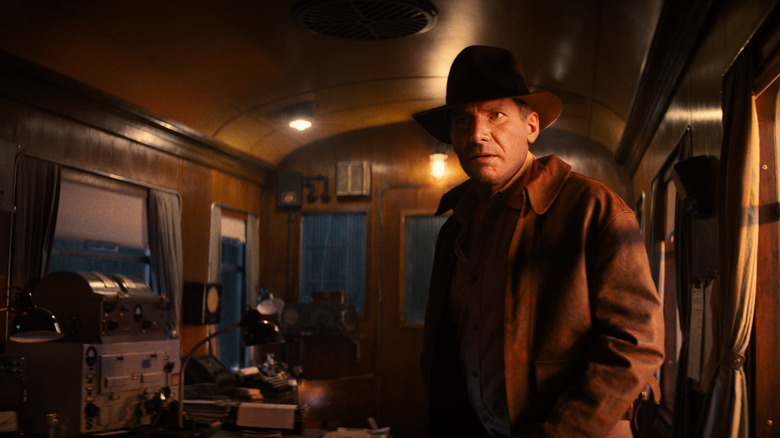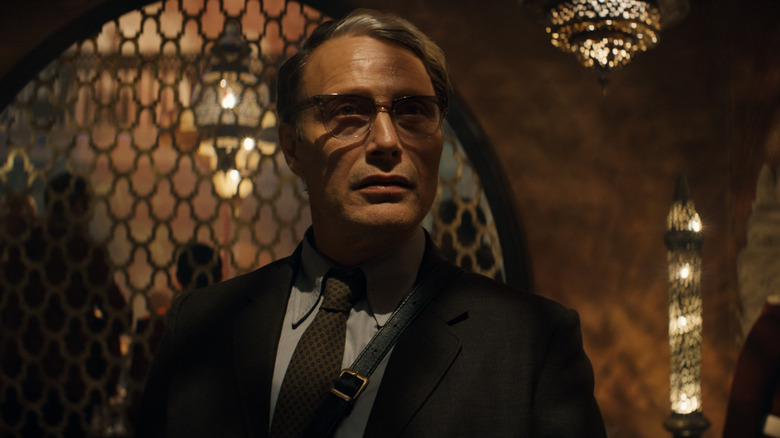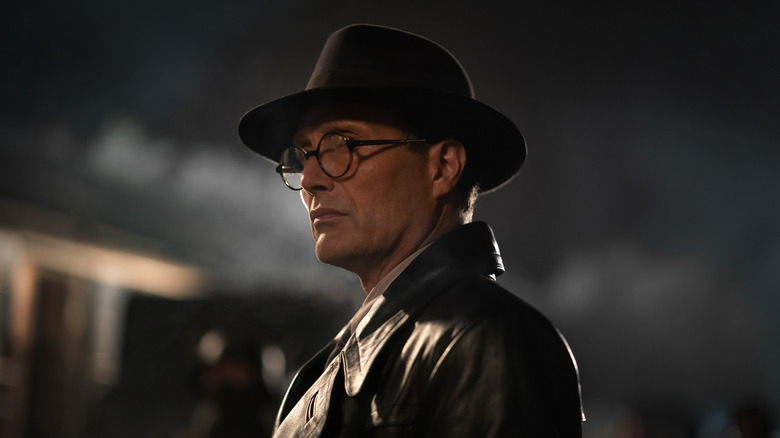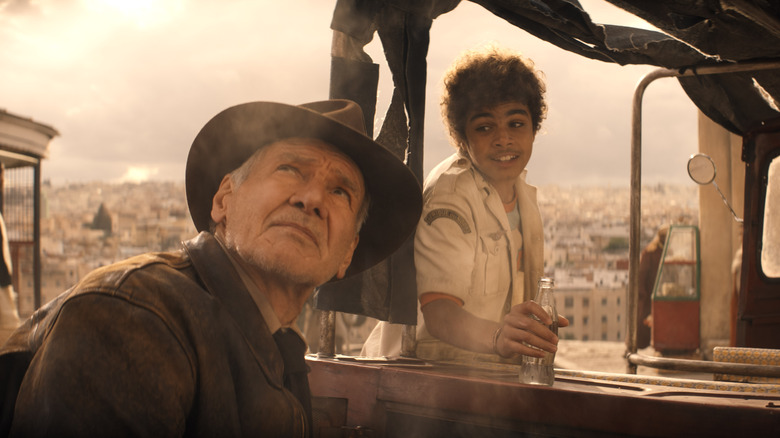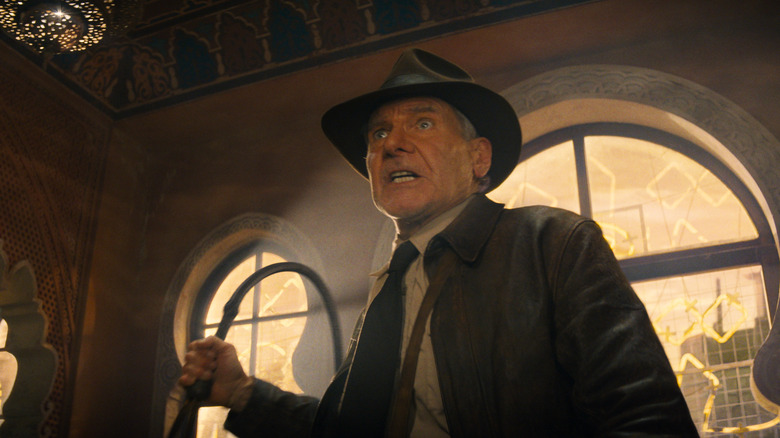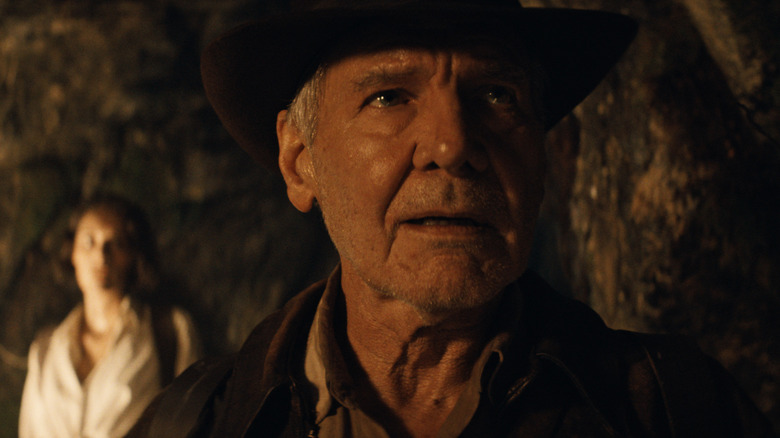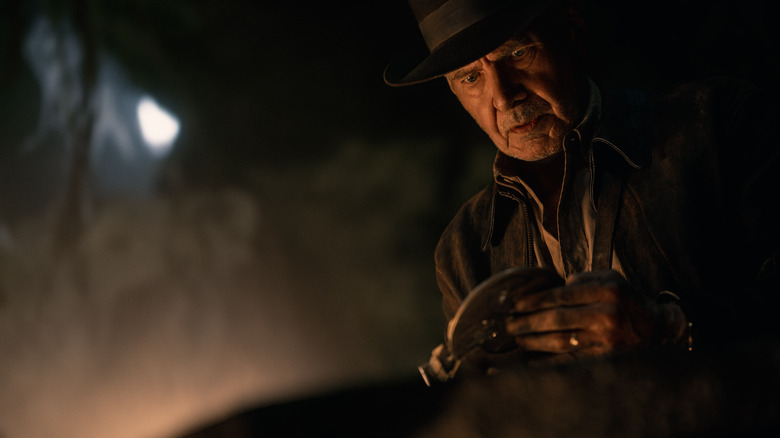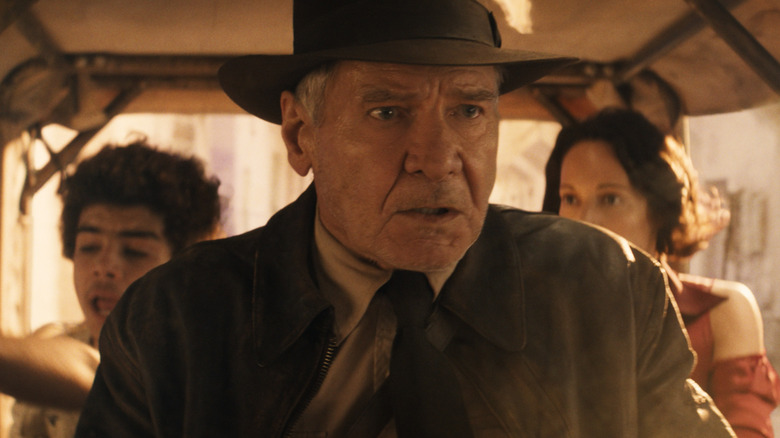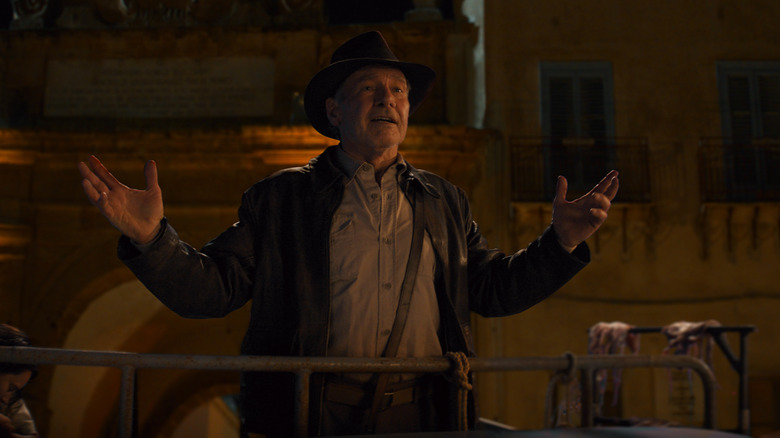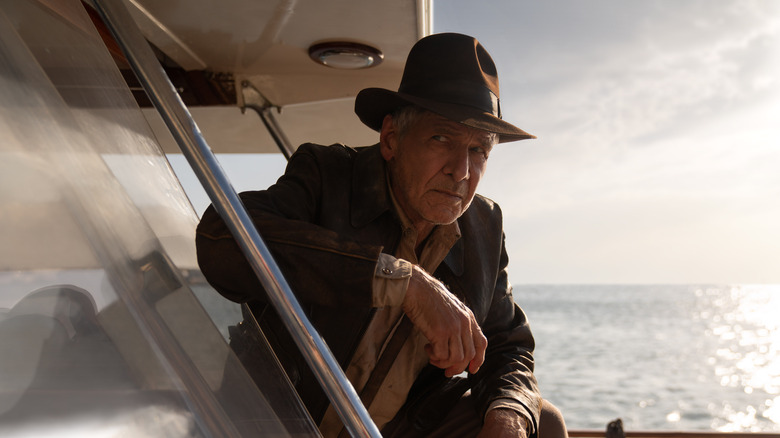Indiana Jones And The Dial Of Destiny's Most Confusing Moments Explained
Although it's been over 40 years since Harrison Ford went on his first adventure as Indiana Jones, he returns for one last ride in "Indiana Jones and the Dial of Destiny." Even though Indy (Ford) is pretty retired at this point, he's pulled back into another adventure dealing with his sly goddaughter, Helena (Phoebe Waller-Bridge), an ancient dial with a mysterious power, and an old enemy. With an old Nazi scientist named Dr. Voller (Mads Mikkelsen) looking to use the dial to change the course of history, Indy must work alongside Helena to stop Voller from enacting his nefarious plans.
"Dial of Destiny" sees the past and present collide in ways this franchise has never seen before and while it does lead to mind-blowing reveals and story turns, it also leads to incredibly confusing moments. From bizarre oversights that'll make viewers question the reality to a final act full of perplexing choices and direction, Indy's latest adventure isn't without its "HUH?!" moments. So, while we're already confused as to how this franchise continues decades after the original, let's delve into the most bizarre and confusing moments of "Dial of Destiny."
Are these Nazis blind?
The film's opening flashback to Indy being captured by the Nazis sees him narrowly escape death thanks to some dumb luck. Due to a wayward bomb, Indy is able to stop himself from being hung, and, oddly enough, that's not even the most unbelievable thing that happens in this opening. Rather, it's Indy's plan to steal a car so that he can hop onto a moving train that makes absolutely zero sense and is baffling to see in action.
To steal a car, Indy punches a guard sitting in the driver's seat, rolls the body away, and then assumes the driver's role as high-ranking commanders get in. Now, it's not like this car is far away from everyone else as there can be soldiers seen loading stuff in the background. So, it's pretty wild that no one saw Indy punch the guard and get in the driver's seat. It's even more bizarre when you realize that the officer get in the backseat literally seconds after Indy knocks the guard out. How could those officers not see the body of the guard Indy knocked out just outside the car or not see the entire exchange take place? The guard's body only got rolled a couple of feet away, so it's mind-blowing how Indy gets away with this one. Suspension of disbelief might be a thing in these movies, but this scene pushes the limits.
Why so surprised?
While Indy is making his way up the train to find the stolen Lance of Longinus, his partner and friend, Basil Shaw (Toby Jones), has been captured by the Nazis and is being interrogated by the intimidating Colonel Weber (Thomas Kretschmann). Although Weber tries to squeeze some information out of Shaw through some violent tactics, he doesn't get much and only gets told a terrible truth when Voller enters the room. Voller and Weber talk about how the lance is actually fake and that Voller has half of the titular "Dial of Destiny." Now while Shaw is a little busy escaping his restraints during all of this, he's only in the next room and makes reactions that acknowledge his being able to hear everything.
So, why does he act so surprised by all this information when he meets up with Indy to talk about it? Seriously though, when Indy tells him that the artifact is fake, it's like he had no idea and he even acts like didn't know the dial was sitting in the room next door. He literally heard them talking about it moments earlier and unless the Nazis are speaking in some kind of secret language, Shaw definitely understands them since he spoke with them before. Shaw is definitely a bizarre character for Indy to partner up with but this takes things to a whole other level of strange.
A fake artifact?
Although the Nazis have collected an immense amount of priceless artifacts during their latest raid, the most notable artifact they find — the Lance of Longinus, which supposedly dates back to the time of Jesus Christ — is surprisingly fake. It's something that baffles Voller, the rest of his Nazi compatriots, and even Indy himself. So, now the only question is — why was this fake artifact stashed amongst all the real ones? It could be to trick treasure hunters into thinking they got an item more valuable than the rest, but it seems like kind of a faulty tactic since the Nazis just took everything anyway.
It's never really explained why there's just this one random fake artifact stashed in this historic treasure trove, but it's likely that it's just a lazy plot contrivance. Once Voller tells Weber that the lance is fake, he takes the opportunity to introduce the dial to Weber and the audience. So, the counterfeit Lance of Longinus is just an excuse for Voller to introduce the dial and it's simply a crummy plot device that doesn't really make much sense the more you think about it.
Face of steel
As the dust from the opening climactic battle settles and Indy is able to boot Weber off the train, Voller joins the fray to turn the tables. With a gun in his hand, he's got Indy and Shaw in a compromising position. Thus, Indy is forced to hand over the dial — which makes Voller incredibly happy. We eventually come to learn that Indy doesn't really give Voller the dial and it ends up being the perfect distraction as Voller is suddenly knocked off the train after he's hit in the face by a sign at high speeds.
Now, most would be right to think that this hit would leave Voller with an irreversible scar that would reflect his inner evil — let alone kill him on the spot. Unexpectedly though, Voller barely has a scratch on his face when he reappears in the present and it makes no sense. That collision was so hard and sudden that Voller's head should be rolling around and decomposing in some woods, so it's unbelievable that Voller could look as relatively pristine as he does.
Just kill them already
Although Voller is determined in seeing his plan through to the very end, he makes some questionable choices that show him just getting in his own way — namely his perplexing choice to not kill Helena and Indy when he has the chance. There are multiple times throughout the film where Indy and Helena are basically sitting ducks or captured by Voller and it's just weird that he never just puts a bullet in their head to stop their pursuit of him. It would literally solve nearly all of his problems and he even has a trigger-happy henchman in Klaber (Boyd Holbrook) who would love to put Indy down.
However, he never does and it constantly backfires on him since they always manage to be one step ahead of him. Sure, he does kind of need them at points since he is following their footsteps and needs some information from them. But once he gets it, he just should've ended things there and it's even more confusing as to why Voller feels the need to bring Indy with him as they head back in time since it literally does nothing but cause chaos throughout the finale. Voller might have some deep knowledge as a scientist and a historian, but he lacks common sense as a villain.
An ill-thought escape plan
Along with Teddy (Ethann Isidore) being Helena's partner in crime, he acts as the group's youthful spark of energy and can be a very useful pickpocket when needed. However, he's unfortunately captured by Voller and his men and is stuck with them after being handcuffed to one of Voller's goons. While Teddy has surely escaped situations like this before, he's in a pretty tough spot and comes up with an escape plan that miraculously works when it honestly should've led to disaster. First of all, this goon is so much bigger and stronger than Teddy so it makes sense that Teddy's best option is to get him into the river below. The only thing is that Teddy literally said he didn't know how to swim earlier so he would surely drown in no time — especially being tied to this hulking mass of a man.
Somehow though, he's able to have enough strength to breathe underwater, stay calm enough to escape his restraints and pin Voller's lackey underwater before swimming away. It's an escape plan that defies logic in multiple ways and really shows that luck and plot armor are both on Teddy's side for this ill-thought escape plan.
Age is just a number
Although "Dial of Destiny" might not see Indy face his deadliest or most physically demanding threats yet, it still doesn't go easy on him. He's still forced to be a part of some high-speed chases, deep sea dives, and high-flying chaos. However, it's clear that Indy is certainly testing the concept of "age being just a number" since he was pretty old at the time of "Dial of Destiny." Given that Indy is about 36 to 37 in "Raiders of the Lost Ark" — which takes place in 1936 — he should be roughly around 70 in "Dial of Destiny" since the film takes place in 1969 when the moon landing was happening.
While he is Indiana Jones — who has been through quite a lot in his adventures — his body certainly can't defy the aging process, right? It's not to say that Indy would be a frail old man at his age or anything, but seriously, it's tough to believe that he can physically handle everything he goes through in the film. At times, there's likely so much adrenaline that would be pumping through his body due to all the intense chases and fights that it would likely induce a heart attack at his age. Plus, when he gets shot or punched it would certainly inflict more damage or have more of an impact on him than in his younger days. Yet, Indy seems just as capable as he's always been and it's a little bizarre.
Indy being a non-believer
When Indy first hears about the dial's potential to send its users back in time, he doesn't believe that it's real. He constantly dismisses Shaw's beliefs that the Nazis want it to change the course of history and all the other lore surrounding this secret power within the dial. However, he eventually comes to believe in the dial's power, but it's honestly weird that Indy had his doubts from the start given what he's been through in the past. Honestly, when you look at what Indy has seen and dealt with in his adventures, it's surprising that he has doubts about anything anymore.
He's literally seen the Ark — which holds power beyond human capacity and reach — as well as gone and searched for the Holy Grail, so nothing should really surprise him anymore. In "Kingdom of the Crystal Skull," he literally discovered the existence of inter-dimensional beings and saw what potential alien lifeforms looked like. So, is it really that out of the question that this dial could hold some time-traveling capabilities? Apparently for Indy it does, at first, and it's just one of the many bewildering ways that Indy is characterized in this film.
Confusing time travel
With the dial being supposedly able to send users back in time, it's no wonder that it's such a coveted artifact. Voller is ready to put a bullet in anyone that gets in his way of obtaining the dial and Indy is willing to put his life on the line so that it doesn't fall into the wrong hands. However, this dial ends up not being as powerful as it's built up to be and features some confusing rules and realizations about time travel. Although it would be expected that the device would take users to wherever they want as long as they could figure out the coordinates, the device seems like it only goes back to its point of origin and it's never coherently explained why.
Did Voller simply get the equation wrong and lead the group down a bad path? Is Indy right that Archimedes didn't account for tectonic shifts in the Earth and that his thinking was wrong? Or, did Archimedes simply make the dial only capable of going to his time so that he could meet people from the future? Frankly, the film doesn't make it completely clear what's right or wrong and it barely even wants to touch on how Archimedes knew that a portal would open in the sky for people to fly through. The film's titular dial is full of confusing aspects that make you constantly scratch your head as the film heads back in time.
History broken?
With Indy, his allies, and grave enemies all being transported back to the time of Archimedes and the Battle of Syracuse, there's an instant concern about what could happen because of their presence. After all, there are surely drastic ramifications for a WWII plane flying through the skies of a battle that took place over a thousand years ago or a major figure like Archimedes interacting with people vastly beyond his time, right? Well, it's tough to say whether there are consequences as the film doesn't explain much of the impact of Indy's antics invading the past.
When Indy and Helena first discover Archimedes' grave, they notice his corpse holding a watch and his tomb showing pictures of a beast that looked like it had plane wings. So, does this mean that the events that take place were always meant to happen and be a part of history? It's possible but it's a little confusing because we see all of that before it happens in real-time. Plus, it doesn't help that the characters never bring that up again or question if their actions broke history. Instead, we just get more questions than answers and it's another confusing aspect of the film's time-traveling finale.
Um, excuse me Indy?
Obviously being transported into the past is a lot for Indy to take in, but it leads to him making one of the most bizarre requests of all the films. Thanks to Voller, Indy is now in the world and epic battle that he's studied and taught for years. There are massive warships firing onto the city of Syracuse and he even gets the chance to meet Archimedes in the flesh. However, none of that should mean that Indy should make the wild request to Helena for him to stay in the past.
Um, excuse me Indy? Maybe he hit his head really hard during the flight or something because his request to mess with the past by remaining there is just bonkers. Just because Indy is feeling depressed about his crumbling life in the present doesn't mean that it wouldn't dawn on him how dangerous interacting with the past can be. Every interaction or action he has in the past can drastically affect the future so his suddenly wanting to stay is totally out of character and mind-boggling. Plus, he's so old at this point that he wouldn't be able to bask in this old world for long and they likely don't have the medicinal care or treatments to heal his bullet wound. Indy's request is absolutely baffling and easily one of the most confusing aspects of "Dial of Destiny."
A not-so wanted man
Although Indy is undoubtedly the hero of this adventure, he's not exactly seen that way by everyone. After Voller and his lackeys kill some of Indy's university companions when they first show up to retrieve the dial, Indy attempts to call for help. Unfortunately, his efforts are interrupted by Voller's cohorts and the unfinished call ends up making Indy a lead murder suspect. Before Indy can even travel out of the U.S., he's considered a wanted man and nearly gets recognized before Sallah (John Rhys-Davies) steps in to save him. However, this surprisingly isn't the case when Indy returns.
When Indy reawakes in the present, there are no cops around ready to cuff him nor any signs that he's still being hunted for murder. Given that the cops would still have no reason to believe that someone killed those people other than Indy, it's a little weird that Indy seems scot-free suddenly. Maybe Helena was able to sneak Indy back undetected or the police gave up because of lack of evidence. However, it's incredibly strange how no one talks about it in the film's final moments, and the mystery of whether or not Indy is a wanted man will continue ... or be left as a total plot hole.
